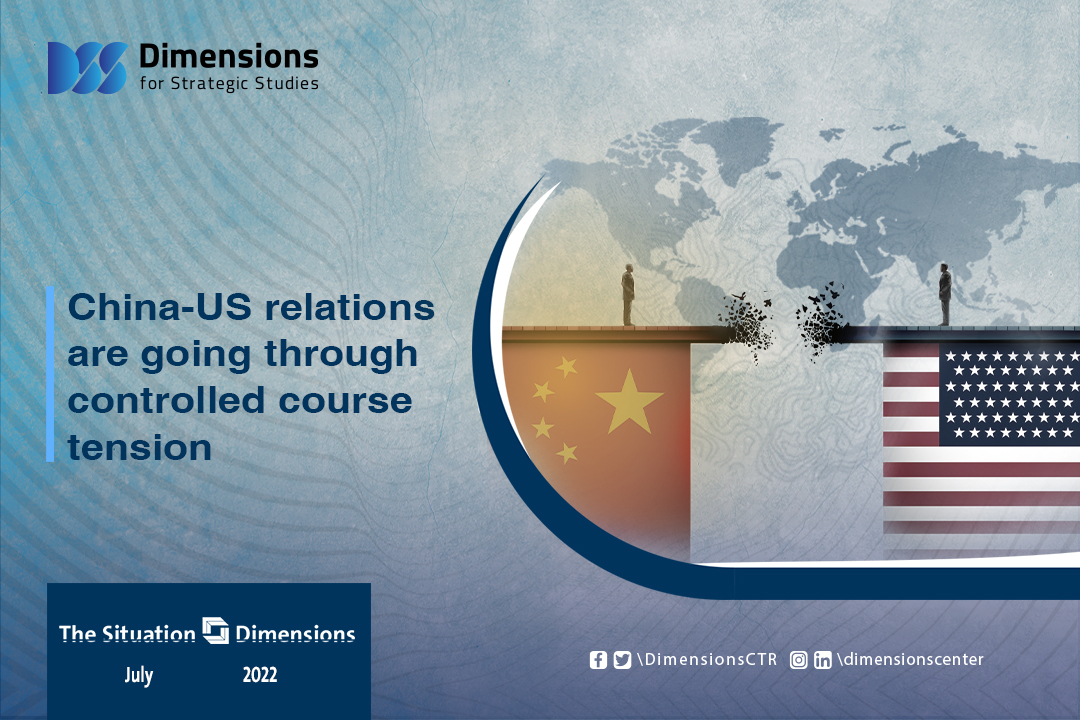
China-US relations are going through controlled course tension
2022-07-222171 view
China-US relations are witnessing great tension against the backdrop of the two countries' positions on several controversial issues. This tension was reflected in the increased tension rate of bickering between American and Chinese diplomats and officials.
The course of relations is currently entering a critical and complex juncture, as China sees itself as a natural competitor to the United States, while the latter is working to contain China and disrupt its expansionist projects.
Several factors have combined to depen the crisis between Washington and Beijing to unprecedented levels. The most important of these fators are the following:
Biden's firm approaches towards China
As a presidential candidate, Biden made it clear that the Trump administration's policies were unable to contain Chinese expansion in the world. He also said that more strict measures should be taken in dealing with China. This is what Biden adopted as a policy after his election in his administration's strategy regarding relations with Beijing. Biden's administration has not only maintained all the policies adopted by the Trump's, it has also added something new; especially in the area of military rivalry.
Beijing's policies toward the United States
Beijing moved forward in defining a framework for the relationship with Washington under President Trump by signing the (phase one) trade agreement with the US in 2020. Negotiations, however, for the second phase of the agreement were hampered after the Biden administration accused Beijing of failing to meet its purchase commitments for U.S. goods under the “phase one” deal. Accordingly, Beijing has taken an escalated trend in its diplomacy that was built on the premise that concluding agreements with the United States will not contribute to achieving China's interests, but rather restrict them further.
Leading the developing world
The United States tries to undermine the Chinese attempts to lead the developing world based on its Belt and Road strategy, which focuses on long-term partnerships with third world countries.
The leaders of the Group of Seven (G7) nations pledged at its meeting last June to raise $600bn to finance infrastructure in developing countries.
The United States is also working on besieging the Chinese presence in developing countries by exerting pressure on the governments of developing countries to stop any cooperation with China in exchange for American protection or support in any form.
Taiwan
Previous disagreements re-inflamed the Taiwan issue and brought back to central stage and reaffirming positions on this issue by the United States and China came as a "geo-security" reaction against the backdrop of the Ukrainian war. As such, both the South China Sea and Taiwan became the main arena of arousing tensions between the two countries, where several military provocations are constantly taking place over there by both parties.
It is likely that the two countries will not be able to achieve agreement unless they can find convergence or de-escalation of tensions, at least on some files, most important of which are:
Completing negotiations on the "phase two" of the trade agreement, provided that the Biden administration is more flexible in containing China's global trade interests.
The Ukrainian-Russian war reaching a stage of stagnation or getting positive moves towards resolving or containing the conflict between the two countries. This will reduce the West's fears of China's moves to take advantage of the war's repercussions.
China's abandonment of carrying out more military exercises or penetrations of Taiwan's airspace on the one hand, and also penetrating territorial waters in the South China Sea on the other.
Reaching an agreement concerning climate change, in which China plays a worsening role. Annexed to this is China’s alleged right to navigate and excavate for resources in the Arctic waters, announced in 2016.
Based on the aforementioned, if China and the United States could not jointly adopt approaches to contain the situation and prevent a wider escalation the tension will escalate. However, it wouldn’t reach a critical point, because the two countries have no desire to reach dangerous scenarios in the course of relations. That's why US Secretary of State, Anthony Blinken held talks with his counterpart Wang Pei on July 9 to discuss differences over the two countries' positions on the world trade and Ukraine.





